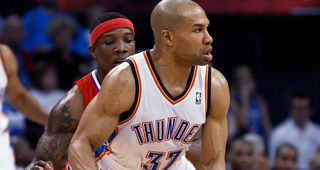There are only 450 possible roster spots in the NBA and there’s a story behind every one of them. Hundreds of thousands of teenagers play basketball competitively in the United States and overseas; only a tiny fraction of them play in college basketball and only a tiny fraction of those ever play as professionals, much less in the NBA. Players can’t take a breath even when they make the league: the length of an average NBA career is only 4.8 years.
That means a 10-year NBA veteran has survived the league being turned over twice in his career. Just making it that long means that at least one team believed in you enough to sign a significant long-term contract. Plenty of guys make a living playing basketball, a 10-year veteran has a chance to make a career out of it, setting himself and the rest of his family up for their rest of their lives.
But, aside of truly transcendent players like Shaquille O'Neal, there’s very little fanfare when a long-time veteran leaves the league. For the most part, even for hardcore fans, they’re merely small notes in the transaction section who slip quickly into anonymity. And as the 2012-13 season gets underway, there are some very notable names not on an NBA roster. None will be in Hall of Fame discussions, but all have had memorable careers worth acknowledging:
Derek Fisher: Fisher was at the right place at the right time for most of his career, but you still have to give him credit for rising to the occasion. As a 6’1, 200 guard from Arkansas Little-Rock without prototypical point guard skills, the odds were stacked against him. However, he was the perfect fit in the triangle, spotting up off the ball, and playing excellent man-to-man defense during his younger days. He won an astounding five NBA championships as the point guard of the Lakers and hit a lot of big shots in his career, but he’ll always be remembered for .04 seconds.
Mike Bibby: Like Fisher, Bibby had to be dragged out of the NBA kicking and screaming, but it shouldn’t overshadow the player he once he was. In college, he teamed up with Jason Terry, Miles Simon and Michael Dickerson on an Arizona team that become the lowest seed to ever win an NCAA title. In the NBA, he was the final piece on the early 2000 Sacramento Kings, who played some of the most beautiful basketball of the modern era and were one of the greatest teams never to reach The Finals. He was a do-it-all point guard, who averaged 20 points, 7 assists and 4 rebounds on 44% shooting in his best season.
Michael Redd: His shooting was questioned when he came out of Ohio State, where he played second fiddle to Scoonie Penn, but he reinvented himself into one of the best marksmen in the NBA. He was fairly one-dimensional, but what a dimension it was: in his best season, he averaged 27 points on 47% shooting. The high-point of his career may have been his time as the designated shooter on the 2008 Olympic Team, as he was never able to fully recover from a series of devastating knee injuries he suffered soon afterwards. He had some bright moments with Phoenix last season, so perhaps a team looking for a shooter might pick him up during the season.
Josh Howard: There were many games in 2006 and 2007 where Howard, not Dirk Nowitzki, was the Mavs' best player. At 6’7, 210, Howard could affect the game in a lot of different ways: as a defensive stopper, rebounder, slasher and passer. However, his reputation never recovered from the messy way he left Dallas, which coincided with an ACL injury that robbed him of his athleticism. He has a reputation as a malcontent, but he was always one of the most thoughtful and interesting players on the Mavericks. If Howard’s career should teach NBA players a lesson, it’s this: never have interesting opinions on anything.
Kenyon Martin: Martin is the last college senior to go No. 1 overall in the draft, and he may hold that distinction for some time. At 6’9, 240, he was an undersized power forward, but still an excellent finisher and defensive player. A National Player of the Year at Cincinnati, a broken leg prevented him from playing in the NCAA Tournament as a senior. You have to appreciate the complete disregard for academics that Bob Huggins’ program had; it’s too bad they never got their moment in the sun. Martin got his in New Jersey, where he teamed up with Jason Kidd to lead the team to two NBA Finals. Even as he got older in Denver, he was still a popular teammate who defended all types of players while also being a surprisingly effective passer on the other end of the floor.
Brian Cardinal: Realistically, if his name was LeBryan Cardinal, he might not have lasted 12 years in the NBA on six different teams. Nevertheless, “the Custodian” certainly wasn’t embarrassing himself out there, and he did provide tough-nosed defense, rebounding and outside shooting whenever he played. The story about his six-year $34 million contract, with Jerry West offering it up as a smart-ass response to his owner asking why he hadn’t signed anyone that offseason, is one of those that is too good to check out. He was never worth the money, but he was always a consummate professional. Most importantly, when the Mavs needed to get 10 minutes a night out of him in one of the tightest NBA Finals in league history, he came through for his team in the biggest moments of his career.

Jonathan Tjarks wrote on the NBA for RealGM from 2011-2016 before joining The Ringer.
Follow @JonathanTjarks on Twitter.


